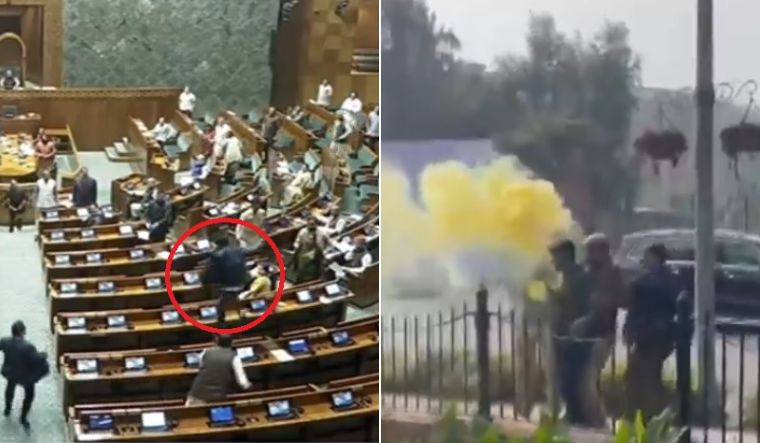The group of six youths arrested in connection with the December 13 intrusion into Parliament have been unapologetic about their actions and had come prepared to face the consequences that might land them behind bars for years, THE WEEK has learnt.
While there has been no evidence of a ‘grand design’ or a ‘larger hand’ behind their actions till now, the detailed unravelling of the incidents and how they were planned will take time as the youths belong to different states with varying backgrounds, with no known record of any criminal act. The only fact that has emerged till now in the Delhi Police investigations is the high level of desperation of the youths to undertake the extreme action with the aim to grab attention. The sole connection between the youths who met virtually is that they were all members of the Bhagat Singh Fan Club page on social media.
On April 8, 1929, in British-ruled India, revolutionaries Shaheed Bhagat Singh and Batukeshwar Dutt had thrown smoke bombs in Parliament. The main aim then, in Singh’s own words, was “to make a loud voice to make the deaf hear”.
At about 1pm on December 13, when the Zero Hour was in progress in the Lok Sabha, Sagar Sharma and Manoranjan.D jumped down from the visitors’ gallery onto the floor of the House and sprayed coloured smoke canisters. At the same time, just outside the Parliament complex, Amol Shinde and Neelam Devi sprayed more coloured smoke.
The group were also shouting slogans—‘Tanashahi nahi chalegi’ (dictatorship won’t be allowed), ‘Jai Bhim’ (Victory to Baba Bhim Rao Ambedkar) and ‘Bharat Mata ki Jai’ (Victory to Mother India)—articulating agendas represented by a diverse range of political parties.
Six people—Sharma, Manoranjan, Shinde, Neelam Devi, Lalit Jha and Mahesh Kumawat—have been arrested by the police till now. While the first four were nabbed on December 13 itself from Parliament premises, Jha was arrested in Delhi on December 14 and Kumawat from Nagaur in Rajasthan on December 16.
A slew of tough charges have been slapped on the youth that range from anti-terror charges under the stringent Unlawful Activities (Prevention) Act (UAPA) to criminal conspiracy, trespass, wantonly giving provocation with intent to cause riot, obstructing public servant in discharge of public functions and assault or criminal force to deter public servant from discharge of duties under provisions of the Indian Penal Code (IPC).
The stunning breach that overrode four layers of visible and two layers of invisible security in Parliament was glaring in view of warnings issued a few days ago by Gurpatwant Singh Pannu, a US-based Sikh separatist and proponent of Khalistan who threatened to “shake the very foundation of Parliament” on December 13.
December 13 was also the 22nd anniversary of the Parliament attack by Pakistan-supported Lashkar-e-Taiba and Jaish-e-Mohammed terrorists in 2001.
On Sunday, Prime Minister Narendra Modi in an interview with a Hindi daily spoke about the Parliament security breach for the first time, saying probe agencies are investigating the incident and taking stringent measures.
“The gravity of the incident which happened in Parliament should not be underestimated. The Speaker has also been taking necessary steps with all seriousness,” the PM said.



